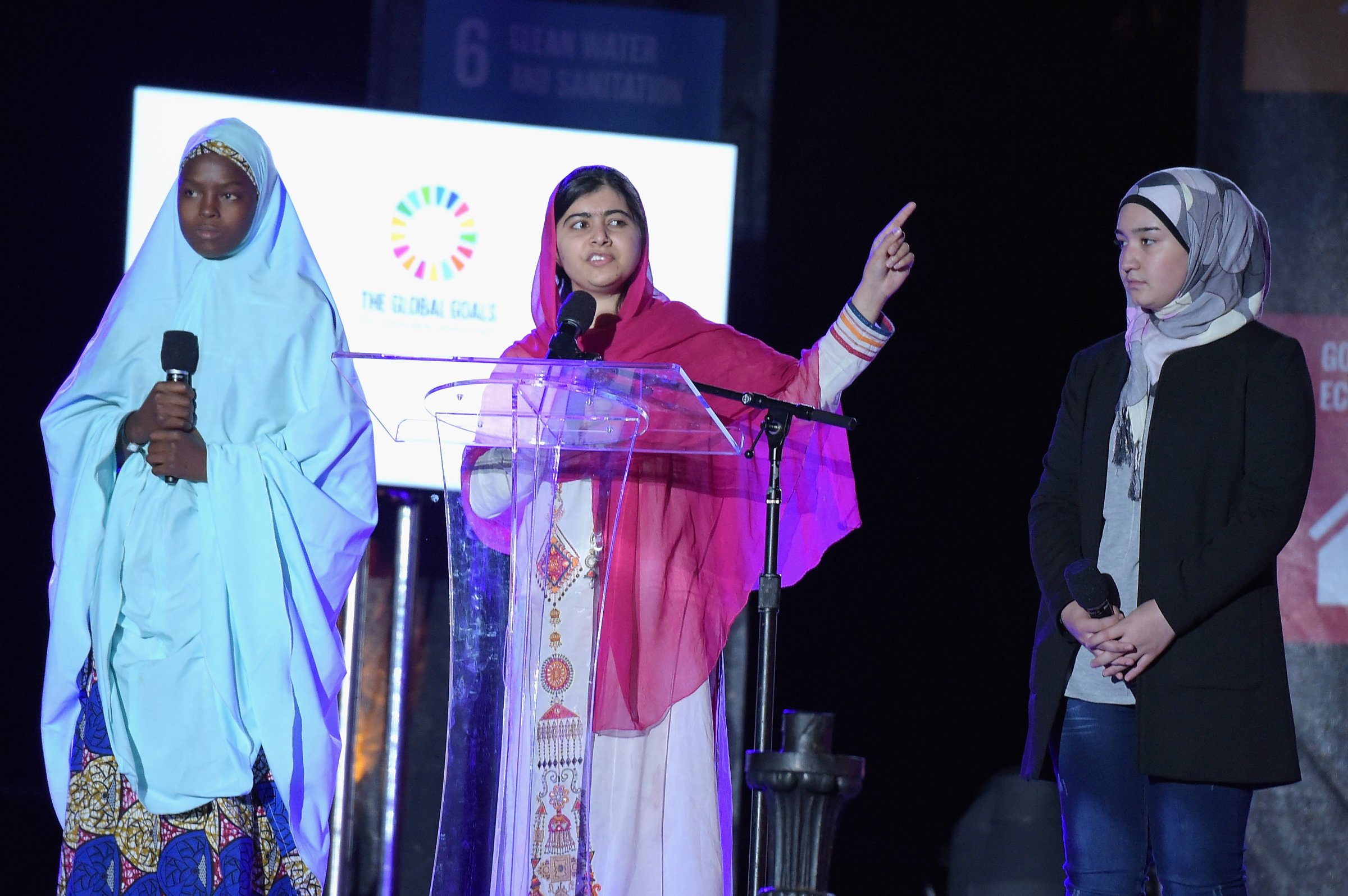
Women and girls took center stage at the Global Citizen Festival in New York City on Saturday night, with Beyoncé, Michelle Obama and Nobel Peace Prize winner Malala Yousafzai rallying more than 60,000 fans in support of girls’ education and other major development goals to end global poverty.
And on Sunday, world leaders gathered at the U.N. to personally commit to fight for equality for women and girls, to end gender inequality by 2030. It was an unprecedented personal commitment from so many world leaders at once, meant to commemorate the 20th anniversary of the Beijing Platform for Action in 1995, the conference where the U.N. outlined steps to eliminate gender inequality, and where then First Lady Hillary Clinton famously said “women’s rights are human rights, and human rights are women’s rights.” Twenty years on, about 80 world leaders spoke about commitments to gender equality, including the leaders of Germany, Chile, Kenya and Mexico. U.N. Secretary General Ban Ki-moon reminded those world leaders that “you have the power and responsibility to ensure that gender equality is — and remains — a national priority.”
German Chancellor Angela Merkel was the first to speak. “We need women for peace, we need women for development,” she said, noting that the German government has expanded child care and passed a law requiring major companies to have boards that are at least 30% female. “Commitments are good, action is better. Let us take action!”
The night before, some of the world’s biggest superstars had joined together to advocate for the same goal. The Global Citizen Festival in Central Park was timed to coincide with the U.N. General Assembly, intended as a call to action to get thousands of live fans and millions of online viewers to hold their governments accountable to the U.N.’s 17 Sustainable Development Goals, a set of 17 targets for global progress to end poverty, promote prosperity and protect the environment.
Featuring glimpses of stars like Stephen Colbert and performances by Coldplay, Ed Sheeren, Common and Pearl Jam, the Global Citizen Festival is the major annual event of the Global Poverty Project, an international advocacy organization founded by the Australian humanitarian Hugh Evans, which aims to end extreme poverty by 2030. The 17 U.N. goals include everything from ending world hunger to ensuring clean water to promoting quality education, but Saturday’s event was mostly focused on ending poverty, taking action on climate change and promoting the rights of women and girls.
The festival comes just a week after McKinsey Global Institute released a study finding that if women and girls participated equally in the labor force around the world, the global GDP would increase by $28 trillion, roughly equal to the combined GDPs of the U.S. and China. So if the goal is to end global poverty, equal rights for women and girls are a good place to start.
Beyoncé selected some of the most overtly feminist songs from her catalogue including “Survivor,” “Run the World (Girls)” and “Single Ladies.” She also included quotations from Nigerian author Chimamanda Ngozi Adichie, poet Maya Angelou and mixed-martial artist Ronda Rousey in her performance.
After Beyoncé finished, Obama came out to hug the superstar and reminded fans to participate in the First Lady’s new campaign to promote girls’ education, asking them to share selfies on social media along with a description of one thing they learned in school, using the hashtag #62MillionGirls. “Right now, more than 62 million girls worldwide are out of school,” said Obama. “As I’ve traveled around the world, I have met so many of these girls, and they are so bright and so determined to make something of themselves … These girls are our girls, and I simply cannot walk away from them.”
Malala completed the triple whammy of celebrity star power, speaking on the importance of girls’ education next to schoolgirls from Nigeria, Syria, Pakistan, and other countries where girls’ education is in peril. Beyoncé and Obama are both tough acts to follow, but Malala seemed more impressed with her fellow students than with Queen Bey. She spoke passionately about the need to reallocate the world resources towards women and girls’ education, and away from military spending.
“It’s not that there is lack of money in this world,” she said. “We have billions and trillions of dollars, but where the money goes is military; it’s things that are useless and that are not useful to society.”
More Must-Reads From TIME
- The 100 Most Influential People of 2024
- Coco Gauff Is Playing for Herself Now
- Scenes From Pro-Palestinian Encampments Across U.S. Universities
- 6 Compliments That Land Every Time
- If You're Dating Right Now , You're Brave: Column
- The AI That Could Heal a Divided Internet
- Fallout Is a Brilliant Model for the Future of Video Game Adaptations
- Want Weekly Recs on What to Watch, Read, and More? Sign Up for Worth Your Time
Write to Charlotte Alter at charlotte.alter@time.com